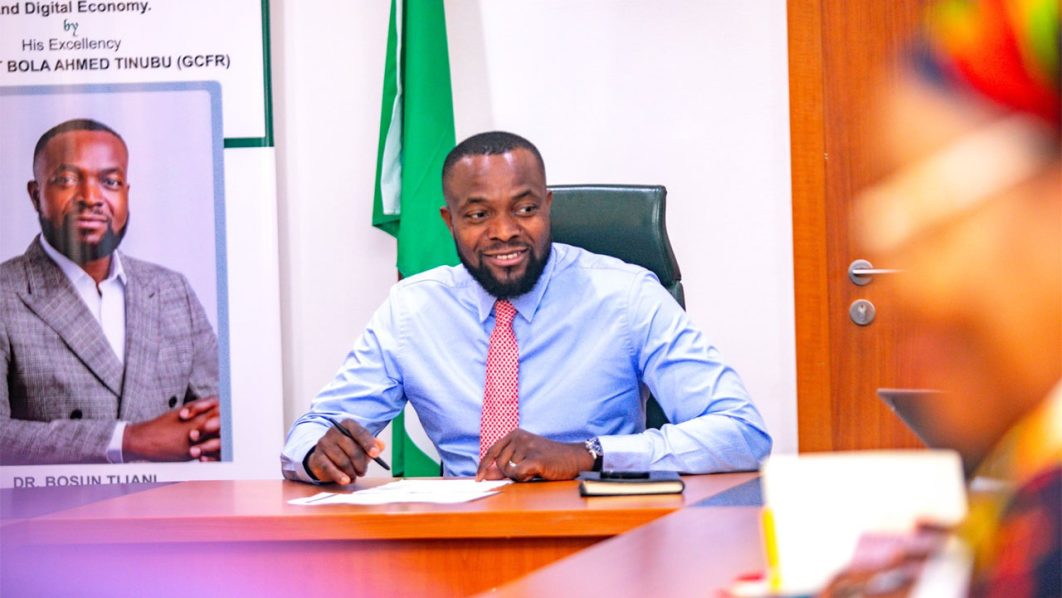
THE Federal Government hopes to create about 50,000 jobs through Artificial Intelligence (AI) by 2030.
The Minister of Communications, Innovation and Digital Economy, Dr. Bosun Tijani, made this known Monday, when he released his Ministry’s draft Strategic Blueprint for the next four year.
In the 31-page document, titled: ‘Accelerating Our Collective Prosperity Through Technical Efficiency,’ obtained by The Guardian, Tijani, who made references to PwC Report, McKinsey Global Institute Analysis and Accenture Report, said AI will usher in a new era of technological and economic transformation over the next two decades.
He said as an emerging economy, it is imperative that the country formulate a far-reaching national strategy to harness the potential of AI in an inclusive and responsible manner.
To that effect, the minister said Nigeria is taking a unique approach to provide the expertise and perspectives needed to craft a forward-looking strategy.
“The implementation of the strategy amongst other things is expected to elevate Nigeria as a top 10 location for AI model training and talents globally. In addition, we will position Nigeria as a global leader in accelerating inclusivity in AI dataset,” he stated.
Tijani said the plan is also to achieve top 50 global ranking (currently 96) in AI readiness and adoption across metrics (Computing Power, Skills, Data Availability, Ethics and Governance) by 2030.
The minister noted that the strategic Blueprint of the Ministry encompasses five key pillars, which include Knowledge, Policy, Infrastructure, Innovation, entrepreneurship and capital (IEC), and Trade.
According to him, each pillar is integral to the Ministry’s mission and interconnected with others, forming the foundation of the strategy.
“Knowledge is the cornerstone upon which innovation thrives, and is built upon the bedrock of sound policies. Infrastructure provides the essential backbone for a thriving digital economy, while innovation and entrepreneurship drive economic diversification. Trade, the fifth pillar, represents our commitment to global collaboration and partnerships, recognising that innovation knows no borders.
“As we embark on this transformative journey, we do so with an unwavering sense of purpose. We understand that the road ahead may be challenging, but it is through these challenges that we find the impetus to evolve and adapt. Together, we will harness the power of technology to elevate Nigeria’s standing on the global stage, create sustainable employment opportunities, and improve the quality of life for all Nigerians,” the minister said.
Recall that in August, the minister called for applications from researchers of Nigerian descent from across the globe to help the country to create its National Artificial Intelligence (AI) Strategy.
Tijani announced this via X (Twitter) and urged Nigerians to share details of any top researcher they know.
In the document he shared on X, titled: “Co-creating a National Artificial Intelligence Strategy for Nigeria,” Tijani said the government is building on existing work done by the National Information Technology Development Agency (NITDA) to develop a National Al Strategy, hence, it is expanding its co-creation approach to engage and include top Al researchers of Nigerian descent globally.
“We are curating a list of the top researchers of Nigerian descent from all over the world to join us in co-creating a National AI Strategy. The strategy will help shape our approach to building innovative tech solutions to our most pressing national problems.
“If there are any researchers you know, Nigerian and non-Nigerian, who have done some work on the Nigerian market, please share in the comments,” he stated.
Explaining the need for AI strategy for Nigeria, the minister said A has become a multi-purpose technology transforming production and service delivery, with the potential to significantly impact economic growth and social progress.
According to him, recent research showed that Al could contribute up to $15.7 trillion to the global economy by 2030, with $3 trillion from increased productivity and $9.1 trillion from new products and services (PwC, 2018).






